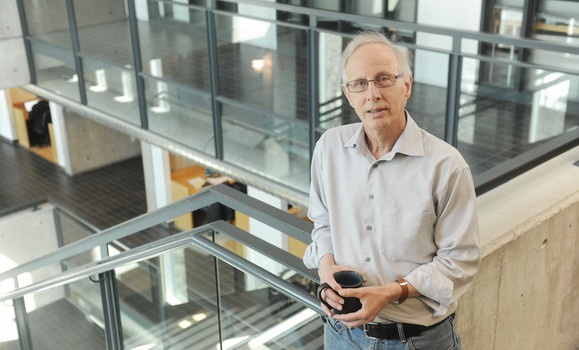Original story shared in the .
Back in 2008, Dr. Shepherd prioritized his focus into three main challenges he felt the Faculty of Computer Science had been facing at that time: falling enrolment numbers, problematically low retention rates, and a shortfall in capitalizing on research talent. All three challenges were fixable but would take some work, creativity – and a lot of help.
Enrolment numbers
Falling enrolment numbers meant a shrinking student body and a serious budgetary problem. Enrolment has increased by 85% from 2008 to 2014 and the Faculty has benefited from a budget surplus for the past five years.
In part, the increase in enrolment numbers over recent years came from national trends of overall rising computer science enrolment, but the Faculty itself played a major role in increasing attendance. Dr. Shepherd enhanced the Outreach Committee, a committee comprised of faculty and staff members focusing on recruitment into Computer Science at ±«Óătv. Through this initiative, he actively promoted programs like the annual Computer Science Day, programming competitions, and participation in university-wide initiatives such as Open House. Dr. Shepherd always recognized the importance of connecting directly with high school students, parents, and teachers and – even through a busy dean schedule – visited many schools in Nova Scotia and Ontario to talk with students about the opportunities that exist in studying computer science or informatics at ±«Óătv.
Student retention
Low retention figures for students created another budgetary concern. The Faculty of Computer Science was having trouble keeping first-year students in the program.
The Faculty worked hard to review the issues and completely revamped the first two years of the undergraduate program. Required labs and tutorials were added to all core first and second year courses, which created a seamless path from year to year for students. Retention levels rose from 56% in 2008 to 82% in 2014. Dr. Shepherd credits a lot of this success to the efforts and contributions from the faculty and staff who were all willing to go the extra mile to make the improvement – especially those who held the associate dean academic position during those years.
Capitalizing on research talents
The Faculty of Computer Science has always been fortunate in being full in research talent, but it was not properly capitalizing on this talent.
To address this concern, a new associate dean research position was created to focus on supporting research within the Faculty. Evangelos Milios took on this role in 2008 and was asked to double the amount of research contracts and grants from $1.5 million a year. Now – with more than $3 million in research funding (grants and contracts) – Dr. Milios’ dedication and hard work enabled him to surpass this target.
His philosophy
Dr. Shepherd's philosophy as dean has been to create an environment in which everyone can be successful: students, staff and faculty.
The community within the Faculty of Computer Science flourished in this framework. The Faculty is now considered one of ±«Óătv’s success stories by senior university administration.
Although there have been successes over these last seven and a half years, it hasn’t always been the easiest path to be on. Dr. Shepherd’s own research and teaching had to be put completely on hold. The dean’s position is a 24/7 job without departments or department heads to aid with human resources, student issues and outreach activities. “I felt that I had reached a point in my career where I wanted to give something back in a different way,” Dr. Shepherd says. “So this was a step I was willing to take in order to help the Faculty and the University.”
What’s next?
After July 1, Dr. Shepherd will immediately take an administrative leave, but will find his old office once again on the third floor of the Goldberg Computer Science Building. In October, he is chairing the Big Data for Productivity Congress at the World Trade Centre – which will bring business, government and academia together to explore, debate and understand the impacts of big data on productivity in the world.
He’d like to get involved with some of the newer Faculty projects such as the new ICT sandbox – ShiftKey Labs – and the Institute for Big Data Analytics. He’s hoping to continue on with some of his outreach initiatives, specifically visiting high schools to talk with students and teachers.
When asked if he had any advice for his successor, he replied: “I learned quickly that progress has to be achieved from the bottom up. It takes time and lots of important discussions to get a Faculty full of independent thinkers all rowing in the same direction.”
“I see a need to recruit more research faculty and to move the Faculty of Computer Science up another level to become the very best of the mid-sized computer science faculties/departments in Canada,” he continues. “The Faculty is developing a transformational fundraising campaign that will make ±«Óătv a recognized Centre of Excellence for Big Data Analytics in Canada.”
The Faculty of Computer Science offers its thanks to Dr. Shepherd for his dedicated work as dean over the past seven and half years.
Recent News
- Calling all gamers: develop your own video game at Global Game Jam 2025
- Computer Science student’s startup promises to make driving safer
- Future alumni: Seif Elbayomi
- Computer Science alum says mentorship is a powerful tool
- Protecting our health, oceans, and future: Dal innovators celebrated at 22nd annual Discovery Awards
- Dal researcher is making smart home devices safer
- Tech triumph: ±«Óătv wins big at 2024 Digital Nova Scotia awards
- Dr. Rita Orji wins Arthur B. McDonald Fellowship, NSERC's most prestigious prize for early‑career researchers

